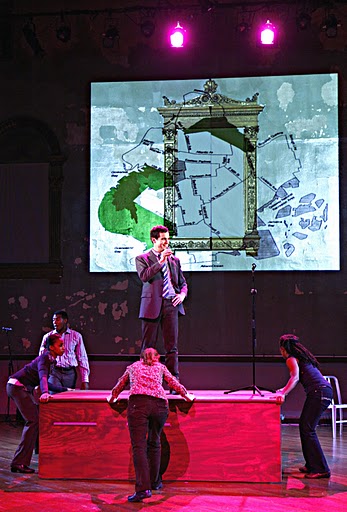Photo/Carol Rosegg
In the Footprint is the most sincere, clever, and enjoyable show to ever represent Marty Markowitz with a basketball, Bruce Ratner with a hand-puppet construction truck, and Jay-Z with a Yankees hat. It is also one of the year's most sincere, clever, and enjoyable shows, period. The docutheater approach (refining on the unbiased--or at least unjaded--magic The Civilians brought to their last work,
This Beautiful City) has captured more than just nostalgia for neighborhoods and communities: it has given faces and names to the numbers, has turned generalities into specifics, and has identified the subtle tragedies of the modern day. It's Theater of the Everyday, an everyday wonder.
Steve Cosson's writing, editing, and directing begins with a childish view of the politics involved in the Atlantic Yards project -- hence the puppets and some lightly audience-interactive trivia -- but it organically shifts with the politics as it moves from 2003 to 2010 (buzz to protest to groundbreaking), from the past of the neighborhood to its gentrified future. As usual, he's well-met by Michael Friedman, who turns facts into songs, jamming words well past their meter for comic effect, but also out of necessity: there's so much to say about ULURP, UDC, and ESDC ("And that's how eminent domain works!"), to say nothing of redlining. These songs come across as a spoof of school pageant plays, and are balanced by half-rapped songs that call more natural rhythms (hesitations and all) to mind, like a far more realistic
In the Heights.
In fact, most of
In the Footprint is balanced -- not when it comes to Big Government, which is routinely mocked, but among the various views, hopes, and disappointments of Brooklyn citizens, all represented by melting-pot of six energetic, utterly convincing actors. (The Anna Deavere Smith-level accuracy of these performances will have to be judged by those more familiar with people like Patti Hagan, Bertha Lewis, and James Caldwell.) They take on everyone, from political bloviators and citizen fighters to area restaurateurs -- like Ravi, who changed his bagel store's name from ARENA to AREA after he learned of the backlash -- and long-time residents like Shaheem: "Ah was round heah when it was RUGGED so I SEEN the transition." It's one thing for Greg McFadden to be somewhat jokey in his portrayal of Jonathan Lethem, but he can't be anything less than serious as Daniel Goldstein, the last tenant to be forcibly bought out (by eminent domain).
With all these stories flailing about for purchase,
In the Footprint does occasionally lose momentum, but that lack of cohesion is as much a part of the larger play as anything else. It's how we can go from the indignation of Bertha Lewis (Donnetta Lavinia Grays) -- "I got gentrifiers, namely you, who don't give a damn about this neighborhood" -- to an annotated commentary on what the proposed iterations of the stadium might look like ("It kind of looks like an alien space ship has landed on the intersection of Atlantic and Flatbush"), to a scene with a Greek chorus of bloggers, to the frustration of Bob Law (Billy Eugene Jones) as he rails against affordable housing for the poor -- which is no substitute for raising the wages and the education of the poor. It's engaging, tantalizing stuff -- raw information, in some cases, presented more or less rawly on the stage of the Irondale Center (which still has the imposing/welcoming stature of a church).
"The ghetto home depot, Park Slope Co-op, the Target, Cellar's Bar, Marcy Projects, the shootings, the hipsters, Spike Lee, Jay Z, the Time Out article the day the rents doubled...," may not seem like much more than a string of words, especially to outsiders, but they make a chilling final chorus. They're not just things; they're memories, and for better or worse, they'll soon be paved over and forgotten -- the drama of the everyday, no less tragic for its subtlety, and all the more powerful when called out on the stage: "You are only entitled to the space that you have," come the final words, dying in a fade to black, "You are not entitled to the space that's all around you."
In the Footprint manages to preserve what it can, and more importantly, to cherish what it's got -- an ephemeral bit of theater for an ephemeral moment.













afraid+3.jpg)






